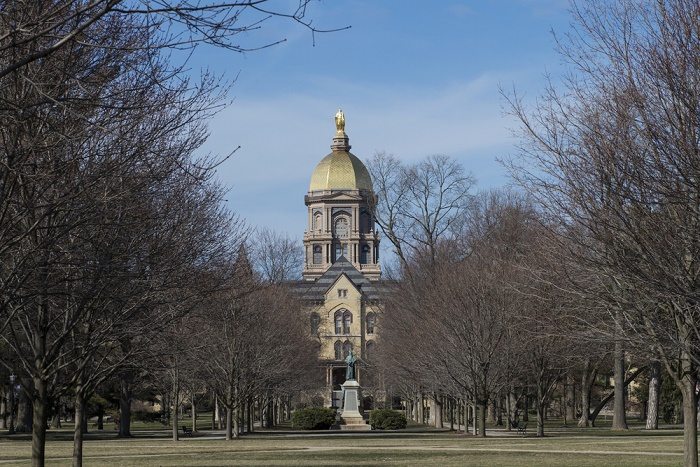Supreme Court Revives Notre Dame’s Challenge to Obamacare Birth Control Benefit
The U.S. Supreme Court on Monday granted a request by the University of Notre Dame, directing that a federal appeals court take another look at its decision to order the university to comply with the birth control benefit in the Affordable Care Act.

The U.S. Supreme Court on Monday granted a request by the University of Notre Dame, directing that a federal appeals court take another look at its decision to order the university to comply with the birth control benefit in the Affordable Care Act.
The order released Monday vacates a decision by the U.S. Court of Appeals for the Seventh Circuit ruling that the Obama administration’s process for accommodating religiously affiliated nonprofits that object on religious grounds to providing employee health plans that cover contraception does not violate the Religious Freedom Restoration Act.
The Affordable Care Act requires some employers that provide health insurance plans to offer plans that cover contraception as part of the package of preventive care services provided to employees at no additional cost or co-pay. The law includes an exemption for churches and other houses of worship. The law also contains an accommodation process for religiously affiliated nonprofits, like Notre Dame, that are not churches but maintain a religious objection to providing plans with contraception coverage. That process allows the objecting employer to complete a form that notifies the administration of their religious objection and triggers a process whereby the insurance company contracts directly with the individuals who want contraception coverage with no additional cost or involvement for the objecting employer.
But last summer, following the Roberts Court’s Hobby Lobby decision (which relied in part on the existence of the accommodation to rule for granting some for-profit companies a similar accommodation), the Supreme Court issued a temporary order in the Wheaton College case, a challenge to the accommodation brought by an evangelical college in Illinois. That order granted Wheaton College’s request for an injunction against the birth control benefit, on the grounds that the college was likely to succeed on the merits of its claim: that complying with the accommodation process violated its religious exercise rights. That prompted the Obama administration in August to amend the accommodation process to try and accommodate the objections of groups like the U.S. Conference of Catholic Bishops and others driving legal challenge’s like Notre Dame’s.
Under the new accommodation process, groups like Notre Dame that claim a religious objection to the birth control benefit must simply notify the administration of their objection. The administration will then take on the task of coordinating coverage between insurance providers and those individuals who want it.
Notre Dame has objected to this requirement, arguing that simply filling out the form to notify its insurance company, or other relevant third party, violates its religious beliefs.
Rather than have the Roberts Court intervene directly, attorneys for the university asked the Court in October to vacate the Seventh Circuit’s decision. Monday’s order directs the Seventh Circuit to reconsider its decision in light of last summer’s Hobby Lobby decision.
It takes at least four justices to grant the kind of request made by Notre Dame.
“Religious freedom is a fundamental American value, and it should be protected,” Louise Melling, deputy legal director for the American Civil Liberties Union, said in a statement. “But it’s absurd to assert that simply filling out a form stating an objection violates religious freedom. What Notre Dame and others really object to is women getting the contraceptive coverage they need. That’s discrimination, plain and simple.”
The Notre Dame challenge is unique. Of the hundreds of lawsuits filed challenging the contraception benefit, it was the first to include attorneys representing the interests of those most affected by the law’s requirement: students and employees. Americans United for Separation of Church and State intervened in the case on behalf of three anonymous Notre Dame students, saying the Seventh Circuit Court of Appeals should stick to its original ruling.
“Notre Dame’s complaint here is trivial,” the Rev. Barry W. Lynn, executive director of Americans United for Separation of Church and State, said in a statement. “Under the current rules, the school is not required to pay for birth control. It must merely tolerate someone’s private decision to use it. In no way is the school’s religious liberty being violated by what students and staff may do in the privacy of their own homes.”
Every federal court of appeals to consider whether the Obama administration’s accommodation process violates the Religious Freedom Restoration Act has agreed with the Seventh Circuit, including the Third, Sixth, and D.C. Circuit courts of appeals.
The case now returns to the Seventh Circuit for further consideration.
